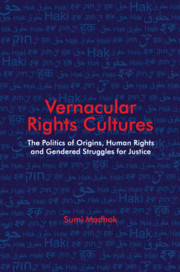Crossref Citations
This Book has been
cited by the following publications. This list is generated based on data provided by Crossref.
Kapur, Ratna
2022.
Race-making, religion and rights in the post-colony: unmasking the pathogen in assembling a Hindu nation.
International Journal of Law in Context,
Vol. 18,
Issue. 4,
p.
499.
2023.
Struggles for the Human.
p.
57.
2023.
Struggles for the Human.
p.
132.
2023.
Struggles for the Human.
p.
175.
2023.
Struggles for the Human.
p.
170.
2023.
Struggles for the Human.
p.
27.
2023.
Struggles for the Human.
p.
1.
Kaur, Kirandeep
Grama, Ben
Roy Chaudhuri, Nairita
and
Recalde-Vela, Maria Jose
2023.
Ethics and Epistemic Injustice in the Global South: A Response to Hopman’s Human Rights Exceptionalism as Justification for Covert Research.
Journal of Human Rights Practice,
Vol. 15,
Issue. 2,
p.
347.
Roy, Indrajit
2023.
Global Handbook of Inequality.
p.
1.
2023.
Struggles for the Human.
p.
105.
2023.
Struggles for the Human.
p.
153.
Cetinkaya, Hasret
2023.
The Coloniality of Contemporary Human Rights Discourses on ‘Honour’ in and Around the United Nations.
Feminist Legal Studies,
Vol. 31,
Issue. 3,
p.
343.
2023.
Struggles for the Human.
p.
81.
2023.
Struggles for the Human.
p.
213.
Tudor, Alyosxa
2023.
The anti-feminism of anti-trans feminism.
European Journal of Women's Studies,
Vol. 30,
Issue. 2,
p.
290.
Almazidi, Nour
2024.
Transnational Anti-Gender Politics.
p.
203.
Mullins, Philippa
2024.
magpie poetry, magpie theory.
Feminist Review,
Vol. 137,
Issue. 1,
p.
20.
Avramopoulou, Eirini
2024.
Affective Activisms and the Right to Have Rights in Turkey.
p.
1.
True, Jacqui
and
Akbari, Farkhondeh
2024.
Geopolitical Narratives of Withdrawal and the Counter-Narrative of Women's Rights Activism in Afghanistan.
Global Studies Quarterly,
Vol. 4,
Issue. 3,
Banerjee, Mouli
and
Rai, Shirin M.
2024.
Parliament as a Workplace: Dilemmas of Vernacularisation and Professionalisation.
Politics and Governance,
Vol. 12,
Issue. ,



